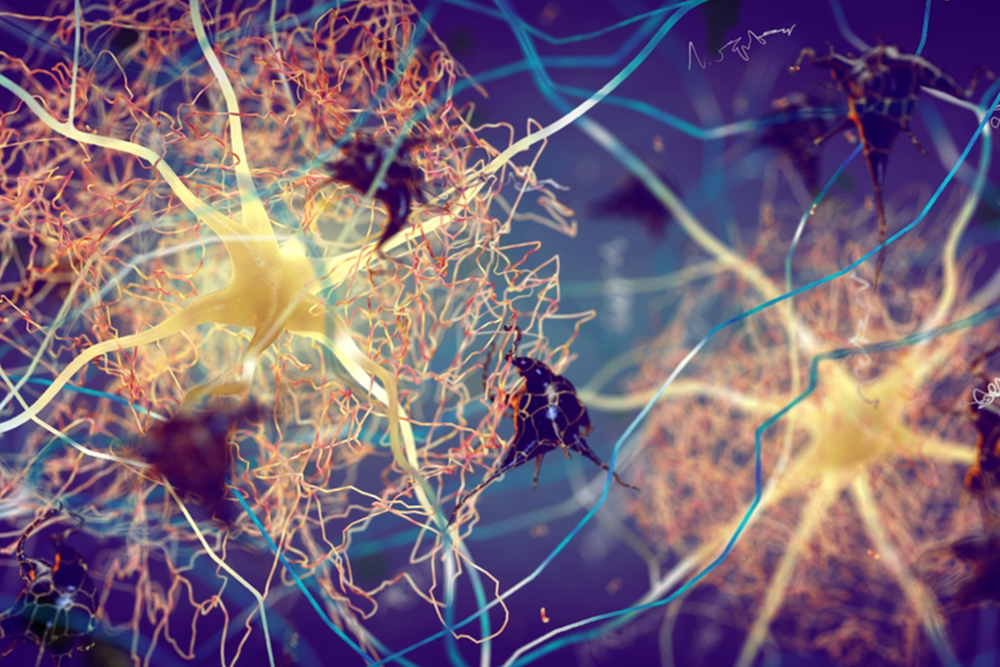Summary of Mitochondria and Synaptic Activity in Neurodegeneration

Mitochondria are essential for synaptic activity and plasticity, providing energy, buffering calcium, and recycling vesicles needed for neurotransmission. Presynaptic mitochondria support rapid neurotransmitter release, while postsynaptic mitochondria buffer calcium for sustained activity. Mitochondrial plasticity, their ability to adapt to neuronal demands, is critical but not fully understood.
Gut Microbiome’s Role in Alzheimer’s Disease

Alzheimer’s disease (AD) is a prevalent neurodegenerative disorder affecting millions worldwide. Emerging research highlights the gut microbiome’s potential role in AD pathogenesis, mediated through the gut-brain axis. Alterations in the gut microbiome, including reduced short-chain fatty acids (SCFAs) and increased lipopolysaccharides (LPSs), can lead to systemic inflammation, blood-brain barrier dysfunction, and heightened amyloid-beta deposition, contributing to AD progression.
MicroRNAs in Alzheimer’s: Key Roles in Early Diagnosis and Treatment

Alzheimer’s disease (AD) is a prevalent neurodegenerative disorder, primarily affecting the elderly, and is the leading cause of dementia, contributing to 50–75% of cases globally. MicroRNAs (miRNAs) have emerged as crucial regulators in AD progression, influencing amyloid-beta production, tau phosphorylation, synaptic function, and neuroinflammation.
2024 Alzheimer’s Report: Rising Cases, Caregiving Strain, and the Urgent Need for Solutions

The 2024 Alzheimer’s Disease Facts and Figures report highlights the significant public health impact of Alzheimer’s disease (AD) in the U.S. An estimated 6.9 million Americans aged 65 and older are living with AD, a number expected to double to 13.8 million by 2060 without medical breakthroughs. Alzheimer’s is the fifth-leading cause of death among older adults and seventh overall.
Vascular Cognitive Impairment and Dementia: How Prevention Holds the Key

As the second most common cause of dementia after Alzheimer’s disease (AD) in North America and Europe, vascular cognitive impairment and dementia (VCID) accounts for 15-20% of dementia cases, though this prevalence can be higher in developing countries. Mixed dementia, where AD and vascular pathologies coexist, becomes more common with age.
Understanding Vascular Cognitive Impairment and Dementia: Key Pathological Mechanisms

Vascular cognitive impairment and dementia (VCID) is the second most common cause of dementia after Alzheimer’s disease (AD), accounting for approximately 20% of cases. Small vessel disease (cSVD), particularly cerebral small vessel disease, is a key contributor to VCID, characterized by stenosis, ischemic lesions, and impaired cognitive functions like attention and executive control.
Vascular Dementia: A Complex Challenge in Aging Populations

Vascular dementia (VaD), the second most prevalent dementia type after Alzheimer’s disease (AD), predominantly affects individuals over 65 years old and arises from cerebrovascular or cardiovascular conditions. Recent findings suggest that vascular-related cognitive decline, either independently or combined with neurodegenerative disorders, occurs more frequently than previously thought.
Navigating Neurodegenerative Diseases: Biomarkers Key to Early Detection

Neurodegenerative diseases like Alzheimer’s (AD), amyotrophic lateral sclerosis (ALS), and Parkinson’s (PD) are rising global health challenges, impairing cognition, motor abilities, and quality of life. As the population ages, these diseases are expected to increase, with slow progression often delaying diagnosis until advanced stages. Biomarkers from cerebrospinal fluid (CSF), blood, imaging, and urine are key to early detection, tracking progression, and evaluating treatments, though each method has tradeoffs.
Saliva Shows Promise as a Non-Invasive Diagnostic Tool for Alzheimer’s Disease

Alzheimer’s disease (AD) is a prevalent neurodegenerative condition affecting millions worldwide, with projections indicating that the number of dementia cases could triple by 2050. Despite extensive research, no curative treatment exists, and current efforts focus on prevention and risk mitigation.
Study Identifies APOE4 Homozygosity as a Distinct Genetic Form of Alzheimer’s Disease

Researchers of a study have revealed that individuals with two copies of the APOE4 gene variant are almost certain to develop Alzheimer’s disease if they live long enough, suggesting that this genetic configuration is not just a risk factor but a distinct form of Alzheimer’s disease. Researchers from Spain and the United States found that 95% of people over 65 with two copies of APOE4 had Alzheimer’s disease biomarkers in their cerebrospinal fluid, indicating that APOE4 homozygosity could be considered a genetic form of the disease.

